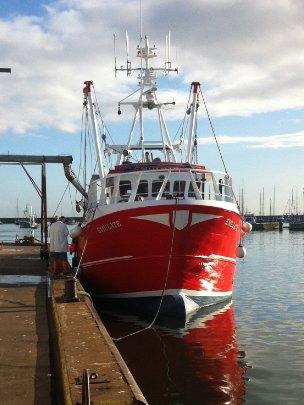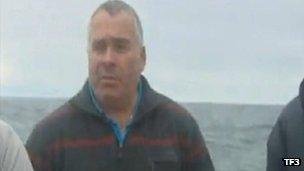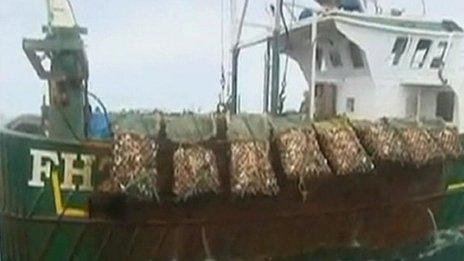British and French scallop trawler clashes blamed on curbs
- Published

The Brixham-based trawler Emulate had rocks thrown at it by French fishermen said its skipper
British trawlermen claim they have been attacked by French fishermen hurling rocks and firing flares.
The incident is said to have taken place on Monday morning in international waters 15 miles off Caen.
The dispute is over scallop beds where the French have a self-imposed closed season for the five months ending on 1 October.
"We've become a lot more nomadic," says trawler owner Alex Passmore as he prepares for the arrival of his boat Emulate in Portsmouth on Friday.
There it is expected to offload £15,000 - £25,000 of scallops fished from the Baie de la Seine where French fishermen have been battling their British counterparts.
For Devon-based Mr Passmore, 28, there is no choice about fishing off the Normandy coast - it is a necessity.
He said "no-take" zones in the traditional local fishing grounds such as Lyme Bay and restrictions on the time trawlers can be at sea have forced crews to look further afield.
Three months ago Mr Passmore spent £700,000 on a new trawler, the 15m (50ft) long Emulate, "because local grounds are closed to us".
His crew of five based at Brixham have been at sea since Tuesday night, a relatively short trip before a weekend off and a return to the scallop beds next week.
It is a 12-hour "steam" to the scallop beds for the Emulate, so every hour counts when the trawler is at sea.
"You have to make hay while the sun shines, to get the most out of the area, which is the Baie de la Seine," said Mr Passmore.
"It would not have happened seven or eight years ago when you could find fish locally."
The Emulate was among a number of British trawlers which fishermen say were attacked by French crews in the Baie de la Seine on Monday.
Four years ago a no-take zone was imposed in parts of Lyme Bay to protect rare corals.
Trawlers of more than 15m are also restricted by EU rules to fish no more than 35 days every quarter.
Fifth generation trawlerman Mr Passmore remembers happier times when his father would have cups of tea and exchange news with French trawlermen.
"They are constantly in our waters and we never moan about them," he said.
'It's robbery'
"It seems times have changed.
"We were in international water and we had a £700,000 boat having rocks bounced off it.

Claude Millinaire has described the English fishing as "robbery"
"I'm not sure if it's a different generation"
French fisherman Claude Millinaire, who was among the protesters in the Baie de la Seine, told France's TF3: "It's robbery. We work intelligently to preserve fish stocks. We leave them to grow during the summer and then it's others who come and reap the benefits.
"We are not OK with that."
Mr Passmore said there was no shortage of scallops in the disputed grounds.
"We can't take scallops less than 110mm wide," he said.
"You can tell if stocks are depleting but there are four or five 105mm scallops for every 110mm scallop so it is sustainable for years ahead.
"I am 28, but I want to do this when I am 58.
"It is all about sustainability, not a quick buck."
Since July 2008 dredging for shellfish and fish trawling has been prohibited in a 60 square mile area of Lyme Bay under the Lyme Bay Designated Area (Fishing Restrictions) Order, external.

British trawler owners with sacks of scallops in the Baie de la Seine fishing grounds where disputes have erupted
New restrictions are also being planned on fishing from Dover to the River Dart in Devon.
Rod Henderson, head of coastal operations for the Marine Management Organisation (MMO), said: "The MMO has the difficult balancing task of ensuring that fish stocks are not overfished and are managed throughout the year.
"We recognise the importance of the scallop fishery and support vessels' needs to maximise fishing opportunities.
"We have been involved in a number of discussions to swap in fishing effort and enable our fishermen to continue working for as long as possible."
The BBC's Hugh Schofield said the French government has said there was nothing it could do to stop the British boats because they were fishing legally.
- Published11 October 2012
- Published10 October 2012